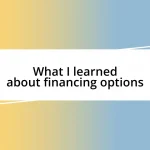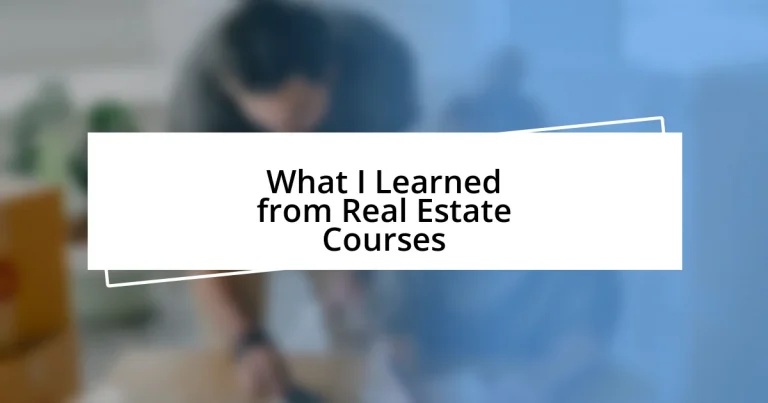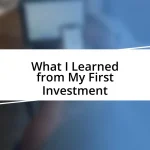Key takeaways not available due to an error.
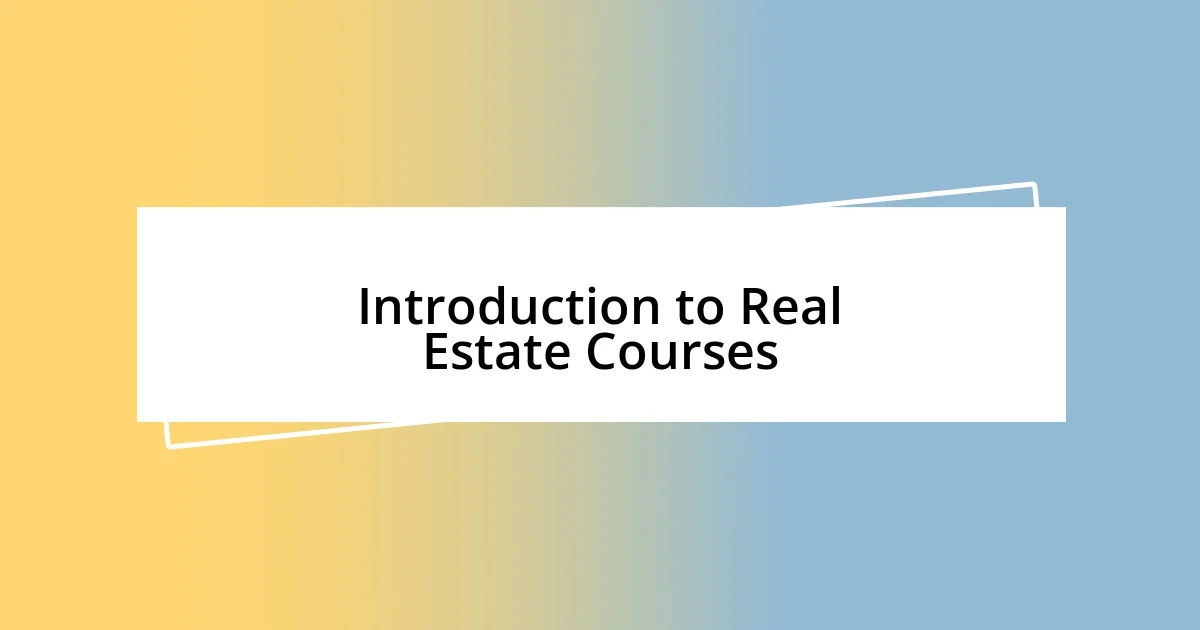
Introduction to Real Estate Courses
Real estate courses opened my eyes to a world that goes beyond just buying and selling properties. I remember my first class, feeling a mix of excitement and apprehension. Little did I know how much I would fall in love with the intricacies of market analysis and property evaluation. Was I intimidated? Absolutely! But as I delved deeper, I realized that these courses were my gateway to understanding the nuances of an ever-changing industry.
Engaging with fellow students gave me a sense of camaraderie. We weren’t just learning from textbooks; we shared experiences, discussed our ambitions, and even voiced our fears about making it in this competitive field. What better way to learn than in a collaborative environment where everyone is equally invested in understanding the market dynamics? It reminded me that the journey to becoming a real estate professional is as much about relationships as it is about knowledge.
I also discovered that real estate courses encompass a broad spectrum of topics. From understanding legal implications to mastering negotiation tactics, the curriculum is designed to equip you with essential tools for success. It made me reflect on my own learning style—how can I really absorb all this information? Well, engaging with the content through practical case studies helped me visualize how theory translates into successful real-life transactions. Isn’t that the dream? To connect the dots and see the concrete impact of what you’ve learned?
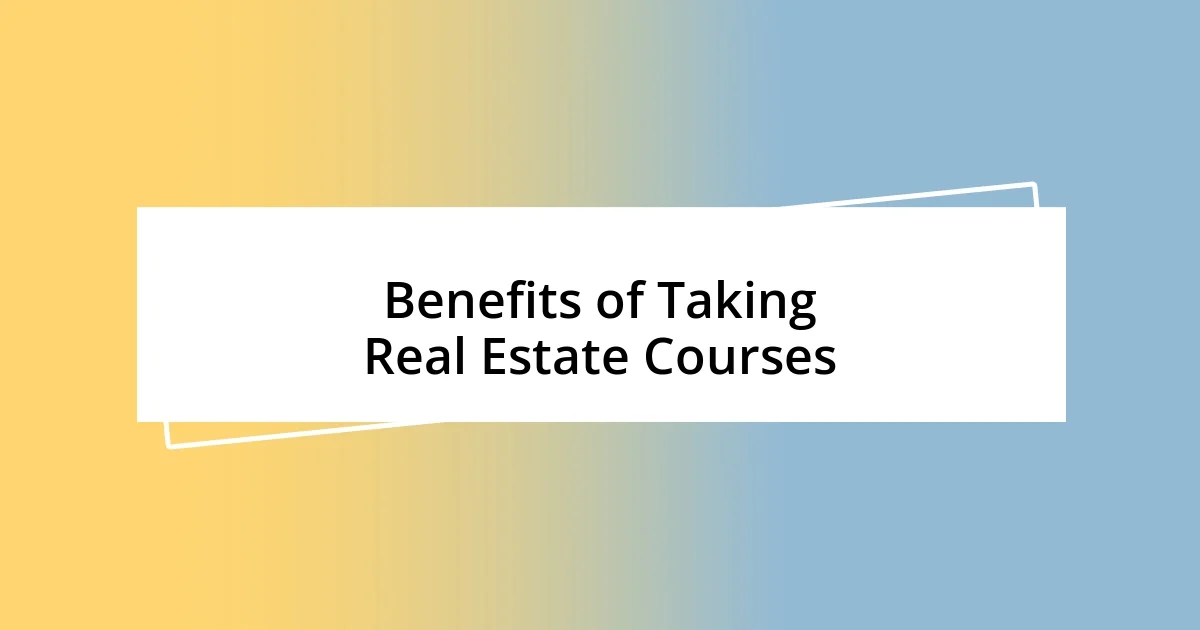
Benefits of Taking Real Estate Courses
The benefits of taking real estate courses are truly transformative, and I’ve experienced this firsthand. One of the biggest advantages is the foundation of knowledge they provide. I recall sitting in my first module, and it was as if a lightbulb turned on. Suddenly, the complexities of real estate began to unravel, and I gained clarity on key concepts like market trends and investment strategies. This clarity has not only boosted my confidence but has also empowered me to make informed decisions in my own property investments.
Here are some key benefits that I found invaluable:
- Comprehensive Understanding: Courses cover crucial topics like property law, finance, and market analysis.
- Networking Opportunities: Engaging with instructors and classmates fosters connections that can lead to future partnerships.
- Practical Skills: Real-world case studies help bridge the gap between theory and practice, allowing me to approach real estate transactions with confidence.
- Certification and Credibility: Completing a course adds credentials to your profile, enhancing your marketability.
- Continuous Learning: They often stay updated with industry trends, helping me remain relevant in a fast-paced market.
By immersing myself in this educational experience, I not only gained knowledge but also cultivated a passion for the industry that continues to inspire me today.

Key Skills Gained from Courses
The courses I took equipped me with essential skills that feel like second nature now. For example, I learned how to evaluate properties thoroughly, delving into aspects like location, condition, and potential resale value. I remember walking through my first property evaluation, and it felt like I was deciphering a complex puzzle. Each piece—like comparable properties and neighborhood amenities—played a vital role in forming a complete picture. With practice, I’ve honed this skill, making the evaluation process almost instinctual.
Negotiation strategies were another crucial area where I saw significant growth. Initially, I struggled with arguing for my position, often doubting my value in the conversation. After extensive role-playing exercises in class, I began to see negotiation not as a battle but as a dialogue. Witnessing my classmates flourish in this area was inspiring; it encouraged me to push through my discomfort. I realized that every conversation is a chance to connect, and understanding the other party’s motivations can lead to win-win outcomes.
Lastly, the importance of legal knowledge cannot be understated. Courses illuminated areas like contracts and zoning laws that felt daunting at first glance. I remember the first time I read a real estate contract—it was like trying to read a foreign language! However, as I worked through the legal terminology, it all started to make sense. This knowledge has not only protected me in my transactions but also given me the confidence to advise others, creating a ripple effect of understanding in my network.
| Skill | Personal Insight |
|---|---|
| Property Evaluation | Initially, it felt like solving a puzzle, piecing together each element until it made sense. |
| Negotiation Strategies | I transitioned from fearing confrontation to seeing negotiation as a valuable conversation. |
| Legal Knowledge | Reading contracts was daunting, but it became empowering as I mastered the language. |

Understanding Market Trends and Analysis
Understanding market trends and analysis is truly a game-changer in the real estate realm. I remember my first class on market analysis; the instructor opened my eyes to the power of supply and demand dynamics. It felt like I was getting my own secret weapon—suddenly, I could predict shifts in the market based on concrete data rather than just gut feelings.
As I delved deeper into the course material, I learned to identify key indicators like median home prices and inventory levels. I recall attending an open house shortly after this lesson, and I felt like I had superpowers. Observing how the property was priced compared to similar homes gave me insights that an untrained eye might miss. It made me question, how many potential buyers are out there, unaware that they could be getting a better deal by being savvy about the market?
The real “aha” moment came when I discovered how external factors like interest rates and local economic conditions impact the market. I vividly remember analyzing a case study that highlighted how a new tech hub could drive property prices up in an area. It was exhilarating to connect the dots and realize that, with the right knowledge, I wasn’t just a passive observer. I could actually position myself advantageously amid these trends. This propelled my confidence and made me feel like I could truly navigate the real estate landscape with a sense of purpose.
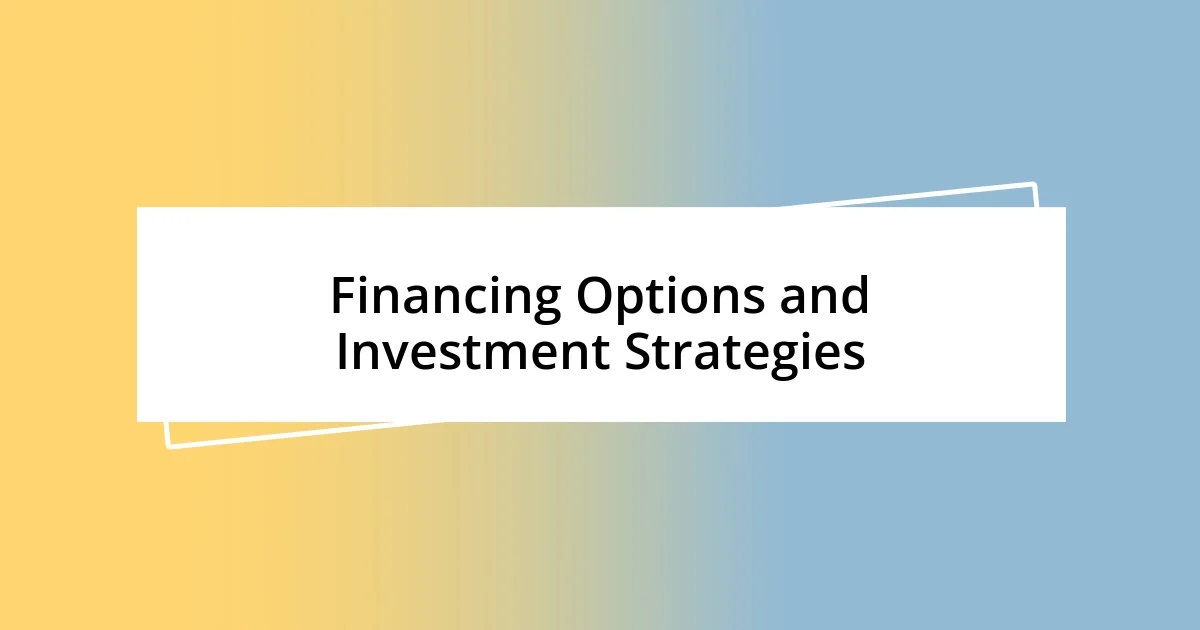
Financing Options and Investment Strategies
Financing options and investment strategies are pivotal elements I’ve discovered in my real estate journey. One key lesson is the variety of financing methods available. Initially, I was bewildered by terms like conventional loans, FHA loans, and even hard money lending. One specific instance that stands out is when I first explored creative financing solutions. Attending a workshop, I learned about seller financing, which completely shifted my perspective. I immediately thought, “Why didn’t I consider this before?” It felt like finding a hidden gem that opened doors I didn’t realize existed.
As I dove into investment strategies, I was surprised to discover the importance of knowing my risk tolerance. At first, I approached each property with equal enthusiasm, but I quickly realized that my strategy should adapt based on my financial goals and comfort level. I remember partnering with a mentor who encouraged me to assess my long-term objectives. That conversation was enlightening; it made me reflect on what success looks like for me. What risk am I willing to take for a potential reward?
Another lesson that resonated was the significance of diversification in my investment portfolio. Initially, I was focused only on residential properties, thinking it was the safest bet. However, after attending a seminar on different asset classes, I began to understand the value of branching out into commercial real estate or even real estate investment trusts (REITs). This realization was empowering—I felt like I was no longer tied to a single strategy. It raised a question in my mind that drove my research: how can diversifying my investments not only mitigate risk but also enhance my overall portfolio performance? Exploring these avenues has given me a sense of adventure in my investment approach that I never anticipated.
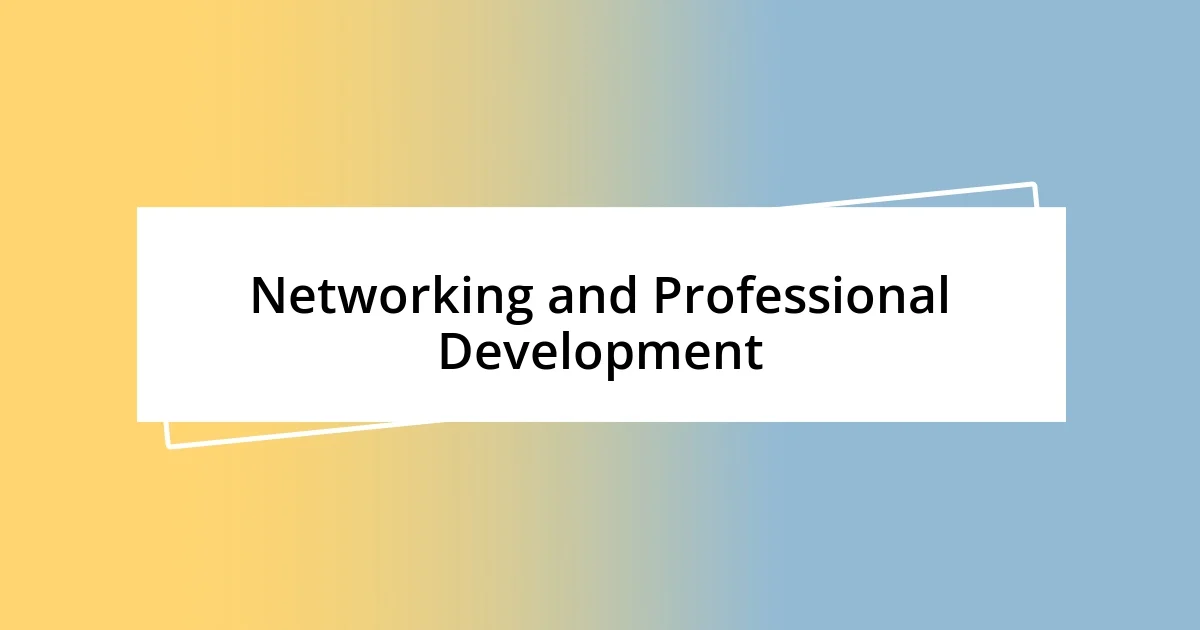
Networking and Professional Development
Building a network in real estate has been one of the most rewarding aspects of my journey. I still remember attending my first networking event, feeling a mix of excitement and nervousness. As I mingled with seasoned professionals, I realized that every conversation was an opportunity to learn or gain a valuable contact. It struck me: who knew that striking up a casual chat could lead to future partnerships or referrals? The sheer potential of those connections felt limitless.
Throughout the courses I’ve taken, I recognized the importance of ongoing professional development. It’s not just about gaining knowledge from books—it’s about applying that knowledge and continuously improving. I recall participating in a workshop where we were encouraged to present our projects to industry experts. The feedback was both constructive and enlightening. Did I expect to be critiqued so candidly? Not really, but those moments of vulnerability propelled my growth. It made me question, how often do we shy away from sharing our work for fear of judgment? It’s a reminder that vulnerability can often lead to valuable insights.
Additionally, I’ve experienced firsthand how joining professional organizations can accelerate your growth. When I signed up for a local real estate association, I found a community that not only provided resources but also nurtured collaborative opportunities. It felt like discovering a tribe that shared my passion. Attending their monthly meetings and listening to guest speakers inspired me to explore new avenues in my career. What if I hadn’t taken that leap? It makes me wonder how many others might also be missing out on incredible growth opportunities simply by stepping outside their comfort zone. Engaging in these networks has been the key to unlocking doors I never knew existed.
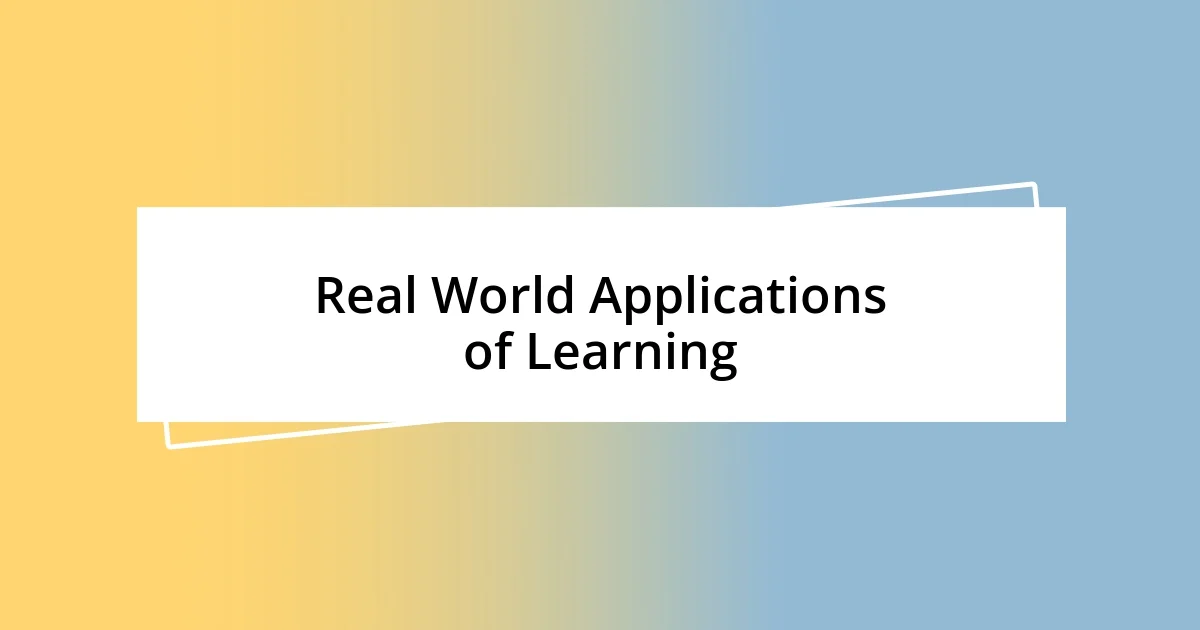
Real World Applications of Learning
Learning from real estate courses has equipped me to apply theoretical concepts directly in my daily life. I vividly recall a moment when I finally understood the impact of market analysis. After studying the principles, I decided to conduct my own market research for a potential investment. I was both excited and nervous—what if I misjudged the data? Ultimately, I found a promising area with emerging trends that boosted my confidence. It was like flipping a switch in my mind; I realized that these skills were not just academic but could guide my decision-making in the real world.
Another eye-opening experience occurred when I implemented negotiation tactics learned in class. One day, I was negotiating a lease for my rental property, and I remembered the strategies discussed during the course. Those lessons came flooding back, giving me the assertiveness to ask for terms that aligned with my needs. I still recall the slight thrill of successfully negotiating a better deal. It made me reflect on the question: how often do we undervalue our negotiation skills? It highlighted for me that effective communication can drastically alter outcomes.
I also found that applying what I learned about property management principles has transformed how I handle tenant relationships. In one instance, after implementing improved communication strategies from my course, a tenant reached out to express concerns about maintenance issues. Instead of postponing, I was proactive and resolved the issues promptly. The gratitude in their response was heartwarming and reinforced my belief: when you treat tenants well, they become wonderful allies in maintaining your property. This taught me that the practical application of theory in real estate can lead to stronger relationships and ultimately a more successful business.




